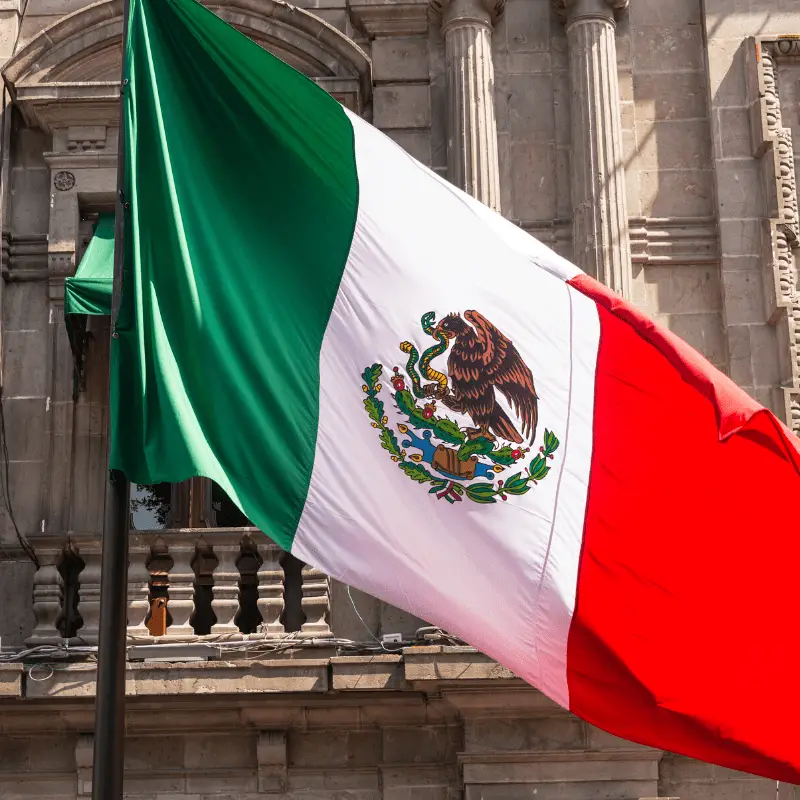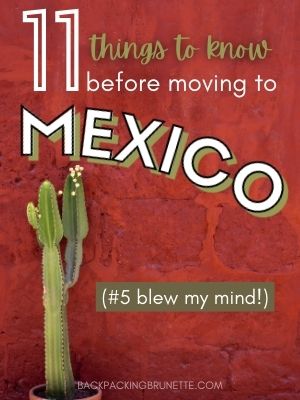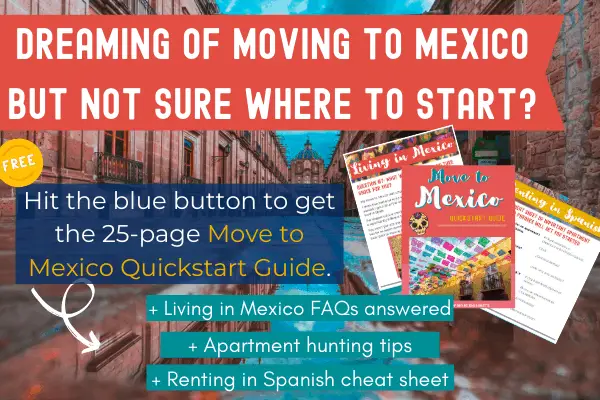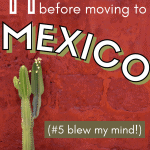
Thinking about moving to Mexico from the US? Here are the things you need to know before moving to Mexico.
When I moved to Mexico from the U.S. in 2017, I did so without reading any lists of things you need to know before moving to Mexico.
That was more than three years ago, but I still remember the things that shocked me like it was yesterday.
After this post, you’ll know 11 things I wish someone had told me before I moved to Mexico in Oct. 2017 including:
- How much money do you need to live comfortably in Mexico?
- What is the safest city in Mexico?
- Is it worth it to move to Mexico?

In Oct. 2017, my partner, Taylor, and I boarded a one-way flight from Detroit, Mich. to Mexico City with two backpacks and one large suitcase each.
When we touched down in Mexico City four hours later, we had to hurry through customs to catch a bus to Querétaro—a city we’d never visited, only recently learned how to pronounce and fairly randomly decided to try to make our home.
Is it worth it to move to Mexico?
To say the past three years have been an adventure would be an understatement. We’ve traveled to incredible places, met so many kind people, overcome the challenges of living in Mexico and grown closer as partners.
Of course, we’ve had our ups and downs, but overall, our time in Mexico has been an overwhelming success. I couldn’t be happier with our decision to move here.
I like to think I’ve done a pretty good job of adjusting to life here, but looking back on that first year especially, there’s a lot I wish someone would have told me before I moved to Mexico.
The author originally published this post in Nov. 2018. She updated it in Feb. 2021.
11 Things to Know Before Moving to Mexico
Even though Mexico has been my home for more than three years now, I’m still learning new things on a regular basis. I promise to update this list as I continue to discover new aspects of life in Mexico.
#1. Mexico is MUCH safer than Fox News would have you believe.
When I started to share my news with friends and family that I was moving to Mexico, I knew there would be questions, but I didn’t anticipate the sheer volume of people who would tell me I was crazy.
I still get those kind of reactions (and worse) to this day.
While it’s certainly tempting to call them crazy right back for their harsh criticism of a country they’ve never even set foot in, instead, I take a deep breath and remind myself that the news is to blame for why they imagine life here as one very long, very bloody episode of “Narcos.”
As in any country, there are places you should avoid, but there are many safe places to live in Mexico.
With its high quality of life and strong economy, Querétaro is one of the safest cities in Mexico. That fact played a huge part in my decision to move here.

#2: Mexicans are incredibly warm and welcoming.
You know how guidebooks and travel shows are always going on about the *~friendly locals~* in “x” country to the point that (if you’re anything like me) you just tune it out?
Well, in Mexico, *~friendly locals~* isn’t just tourism propaganda: It’s the truth.
While shopping at Mercado La Cruz during my first week in Mexico, one of the vendors asked me where I was visiting Querétaro from. I told him I’d just moved to the city.
The vendor introduced himself as Fernando and said he wanted to give me something to welcome me to Mexico. He put four coffee mugs on the counter and said they were a housewarming gift.
During my time in Mexico, I have experienced more kindness from strangers than I ever did living in Spain or the U.S. I wouldn’t fault Mexicans one bit if they were closed off or wary of foreigners, but the opposite is true.
Countless people have gone out of their way to make me feel at home here.
Another example of how warm & welcoming Mexicans are is how pet-friendly the country is. Dogs are welcome in many cafes, restaurants and even shopping centers! Learn more about bringing your pets to Mexico.
#3: You will gain confidence speaking Spanish.
When I left Madrid, I was feeling really down about my Spanish skills. Even after two years in Spain, my level still wasn’t anywhere near where I wanted it to be.
Living in a city filled with foreigners and tourists made organic opportunities to practice Spanish hard to come by. Not to mention, Spanish people’s proclivity to correct didn’t do much for my confidence.
But, when I moved to Mexico not only did I have opportunities to speak Spanish on a daily basis, but I quickly gained confidence speaking because (unlike in Madrid) people were making an effort to understand me.
The guy at the corner store didn’t care if I messed up a conjugation or fumbled my pronunciation. He was pleasant and patient while I got out whatever it was I was trying to say (usually inquiring after fresh papaya).
In Madrid, making a mistake while speaking Spanish frequently felt like the end of the world. In Mexico, I realized mistakes weren’t a big deal and being understood is more important than being perfect.
#4: Finding an apartment in Mexico can be tough.
Toward the end of our first week in Querétaro, I struck up a conversation with a bartender about apartment hunting in the city center. He told me it had taken him a YEAR to find his place in the centro histórico.
When I heard that, I almost spit my cerveza out.
Up until that point, I’d been going about apartment hunting in Mexico using the same strategies that I’d used to successfully find an apartment in Madrid: scrolling online listings and walking the streets in search of “for rent” signs.
In Mexico though, landlords don’t always list places online and prefer word-of-mouth to find renters. Apartment hunting is especially challenging in a city like Querétaro where many landlords have never rented to foreigners.
You can read this post for the whole crazy story of how I found my apartment in Mexico.
#5: Landlords in Mexico require a “fiador.”
If you don’t know what a fiador is, don’t worry. Neither did I when I first moved down here, and Taylor had to look it up via Google Translate when a landlord mentioned it at the very first apartment that we saw.
In English, a fiador is a guarantor. In other parts of Mexico, people call it an aval.
Basically, your fiador is responsible for paying your rent if you decide to skip town. In Mexico, an eligible fiador is a Mexican citizen and a property owner.
Many landlords require you to have one if you want to sign a lease.
Fortunately, my mom’s cousin owns a home in Querétaro and is a Mexican citizen. She graciously agreed to be our fiador, but I know that other expats aren’t as lucky.
In the Move to Mexico Quickstart Guide, I cover how to sign a lease in Mexico without a guarantor.
#6: You can furnish an apartment in Mexico on a budget.
When I first got to Querétaro, I focused my apartment search on furnished places. However, since Querétaro isn’t a huge expat destination, there aren’t a lot of furnished apartments on the market.
I did see a few, and because I feared blowing my budget furnishing an apartment myself, I almost took a place that I hated.
But before settling, I decided to look at one last apartment in a location that I absolutely loved, even though it was unfurnished.
Because I loved the style of the house and the location, I decided to go for it. It fit the vision I had for my life when I decided to move to Mexico.
The day that we moved into the apartment with just our two suitcases and two backpacks, I worried that I’d made a mistake. We were in a huge empty house and didn’t even have a mattress to sleep on.
Between Amazon Mexico, Walmart, secondhand stores and the market, furnishing an apartment in Mexico is easy to do on a budget.
Want to see how my apartment turned out? Check out my Mexico apartment tour on YouTube.
#7: Direct deposit isn’t popular in Mexico.
Our landlord prefers (insists, really) on us paying the rent in cash.
When we first moved in, we tried to set up a direct deposit with her, and she acquiesced to our request for exactly one month before going back to showing up the first week of every month (never on a set day) to collect the rent.
This used to really irk me because paying via direct deposit just seemed more convenient for everyone involved. But, as I’ve learned over the years, Mexicans aren’t as concerned with efficiency as people from the U.S.
Whatever though: I love my apartment, and if getting out a ridiculous stack of pesos from the ATM each month and stuffing it into an envelope for my landlord means I can live here, then I am happy to do it.
#8: You can’t open a Mexican bank account with just a tourist visa.
Apparently, you used to be able to open a bank account in Mexico with just a tourist visa, but in order to help control money laundering and other crazy stuff like that, the law now requires foreigners to have at least a temporary residency card in order to do so.
To combat ATM fees that were just about destroying my soul, I opened a Charles Schwab checking account. Because they reimburse you for any and all ATM fees, I highly suggest getting one if you are moving abroad or travel frequently.
Getting your finances in order one of the most important things to do before moving abroad.
#9: Internet providers will test your desire to live in Mexico.
My best piece of advice for anyone wanting to move to Mexico: Avoid Megacable. During my first year living in Mexico, the internet caused the majority of my stress.
It took a month for someone to finally come to install the WiFi, and when our internet went out, the technicians didn’t come to fix it for three days.
Because I work online, the whole internet thing is an issue very near and dear to my heart (and bank account). I’m not kidding when I say that, at various times, I thought we might have to leave Mexico and move back to the U.S. because the internet was so unreliable.
In 2020, we switched to Telmex and are much happier with the service. It’s fast, reliable and affordable.

#10: Mexican landlords will raise your rent each year for inflation.
On the initial lease for our apartment in Querétaro, the contract listed our rent at exactly $10,000 MXN per month.
After a year, when the time came for us to resign the lease, our landlord said that she was increasing the rent to accommodate inflation.
At first, I felt shocked. I worried she was trying to rip us off.
But after talking with my Mexican neighbor who has the same landlord, it turns out that rent being adjusted for inflation is actually pretty normal in Mexico.
Here’s how much our rent has gone up every year since moving to Mexico:
- Year One: $10,000 MXN per month
- Year Two: $10,800 MXN per month (+$800 MXN)
- Year Three: $11,500 MXN per month (+$700 MXN)
Despite rising rent prices, the cost of living in Querétaro is much more affordable than it is in the U.S. You can read my post detailing how much I spend each month living in Mexico.
I believe you can live comfortably in Mexico for around $1,000 USD per month.
#11: You can easily live on just a tourist visa in Mexico.
Mexico allows U.S. and Canadian passport holders to stay in the country for 180 days on a tourist visa. You can see all the countries on Mexico’s “no visa” list here.
After 180 days, you must leave Mexico, but you’re eligible for a new tourist visa virtually immediately.
In comparison to the Schengen Zone visa which only allows visitors to stay for 90 days within a 180-day period, Mexico’s tourist visa is incredibly generous.
Before I applied for temporary residency, I lived on the tourist visa for more than two years. During that time I was able to:
- Rent an apartment
- Contract internet from two different service providers
- Get health insurance
Because readers and subscribers often ask me:
I never did a “visa run” to Belize or Guatemala. Some foreigners living in Mexico on tourist visas will leave and re-enter Mexico in a single day.
Until the pandemic hit, it just worked out that I would go back to Michigan at least once every six months to see family and friends.
In July 2020, I decided to apply for Mexico’s temporary resident visa. With my temporary residency permit card, I no longer have to leave Mexico every six months.
Other benefits of temporary residency in Mexico include the ability to open a bank account and register a vehicle.
Other Posts About Moving to Mexico
- An Expat’s Guide for Living in Querétaro, Mexico
- Tips for the Perfect Thanksgiving in Mexico
- 11 Best Places to Live in Mexico for Expats in 2021
- How to Move to Another Country and Start Over (18 Expat Tips)
More Things to Know About Moving to Mexico
After more than three years of living in Mexico, I have a lot of advice for people planning their own moves to Mexico.
When you download the free 25-page Move to Mexico Quickstart Guide, you’ll get answers to your most burning questions about moving to Mexico such as:
- What’s the most complicated part of moving to Mexico?
- How can Americans earn money while living in Mexico?
- Do you need to speak Spanish to live in Mexico?
I also reveal my top tips for apartment hunting in Mexico PLUS a renting in Spanish cheat sheet with the exact phrases you can send a potential landlord when asking about a property.
Nearly 1,000 people have already downloaded the free Move to Mexico Quickstart Guide. See what people are saying about it:
“I just finished your Move to Mexico Quickstart Guide, and I found it very helpful with some things I had not heard of or thought of, even from other Mexican expat YouTube publishers. Thank you for sharing your real-life common experiences. With this knowledge, you saved me a lot of stress and at least maybe $500 USD or maybe more.”
Jon F., Downloaded the Move to Mexico Quickstart Guide in Feb. 2021
Click here to get your own FREE copy of the Move to Mexico Quickstart Guide delivered straight to your inbox or scroll down to signup below.



Hi Alex,
Loving your site and that I found it, thanks so much for your sharing your experiences for those who might want to follow your path.
I have a couple quick questions, thought I already posted this on “Cost of Living in Queretaro” but it disappeared? or something. So I’ll try again.
I am an older gentleman from US looking to move before end of this year, maybe a lot sooner. As far as budget goes, I’m wondering if a single person can afford to live on say $1400 a month there? I am hoping to, as a safety net, develop some freelance online work income, but can’t count on that to start. So is $1400 a doable/realistic budget for a single person to get by on in Queretaro or should I be considering another city/town? If so, what town/s would you suggest are more affordable on that budget and overall good as far as general safety and good place for expat to reside without being in the complete boonies (if such place exists that you are familiar with or suggest I research more myself)?
And finally, I am interested in learning more about teaching English as you do for the company you mentioned you teach online for with Chinese students. I have a BA in English and a Master’s in writing, so I’d think I would be a good candidate to teach to supplement my monthly income. Thoughts? Thanks so much in advance, and again, love your efforts to share and your site.
Queretaro or [_________?___________], here I come.
Paul
Dear Paul,
You can certainly live, and live well, in Mexico on $1,400 per month. Many retirees here are doing just that.
Retired Americans live truly in every Mexican city and town, but are concentrated in San Miguel de Allende and Ajijic, on Lake Chapala. Go to YouTube.com and search on these three place names – many, many informative videos. But I am not saying you should choose a place with many retirees. That’s just one option.
To address the question of how to choose your destination in Mexico, first decide – do you want one of the two retiree towns? If not, do you want a city or a town? I don’t think the cost of living varies much across Mexico. It may well be higher in the two retiree towns I mentioned.
I am choosing largely on the basis of climate. Wikipedia’s pages on various Mexican cities are a good source for climate info.
I’ve been in Ajijic, or nearby, for about six months, and I’m thinking of moving to Queretaro after looking at various other Mexican cities. Saying ‘Ajijic’ actually refers to a string of towns along the shore of Lake Chapala. There are at least 10,000 retired Americans here, and an excellent organization (the Lake Chapala Society) and a plethora of volunteer organizations that retirees have started over the years.
I seem to have reached the age of 66, but I find my fellow retirees to be a bit dull. Also, the climate here is too hot for me. Hence my research on Queretaro.
Have you considered teaching English as a Second Language? This requires a certificate, which you can earn either online or in the classroom. Cost ranges from $200 to over $2,000. With your educational background, you will breeze through these programs – though they are worthwhile. Here’s a site to start – https://www.bestcollegereviews.org/top/online-tefl-certificate-programs/
Teaching online is certainly worthwhile; I just like the excitement of live contact and especially I like making my class laugh.
Feel free to post here in reply, Celeste
Hi Alex,
I want to say I appreciate you providing so much detailed information about Querétaro. This has helped me a lot while I decide on which Mexican city I’d like to move to. I teach ESL online as well, so dependable internet is also important to me. Do you use a hotspot or some other backup device when you experience an outage? I’ve been trying to decide if it will be better to buy a hotspot or use my phone’s data plan (once I get that all figured out down there). Thank you!
Hi, Danielle!
How cool that you’re planning on moving to Mexico! I’m so glad you’ve found the info on my blog helpful. As of about five months ago, I no longer teach ESL online, but don’t worry: I still have a recommendation for you. Personally, I never used my mobile hotspot or had a backup device for teaching. Looking back, I wish I had though. Even though they weren’t super frequent (about three in the 2.5 years I’ve lived here), outages were still SO stressful. Before I stopped teaching English, I was considering buying a Skyroam hotspot. I liked the plan where you only pay for the days you use it. I hope that helps, and please feel to reach out with any other questions you have about moving to Mexico.
All the best,
Alex
Hi, my family is moving to Mexico for a year, as a sabbatical. My feelings about moving abroad change daily. Thanks for sharing your experiences and challenges.
Thank you for reading & taking the time to leave a comment. Best of luck with your move to Mexico! My best advice is to look at the move as an adventure. Doing so puts me in the right mindset to deal with the ups & downs.
Same here… We tried Merida last November after watching thousands of youtube videos and loving yet. But when I got there I couldn’t deal with the lack of trees – where we are, in Midwest we have tones of trees everywhere, all is green. Merida was cement and dust – but beautiful. colonial.
This year we went to Cabo and liked it more, and we booked a month in Puerto Vallarta next summer to experience the heat/humidity and see if we can do it. I love the ocean/mountain combo in PV, and there are trees everywhere.
We would like to retire early (and do some online work too) and we cannot do that in the US – due to cost of health insurance and rent etc, plus we love to live in a walkable place with no car, which is not possible in the US. We thought of Europe but it is too far so we go back to Mexico…
Thanks for sharing your experience! If people are able, they should definitely travel around Mexico before deciding on a place to live. Sometimes, you don’t know what you want in a city until you know what you DON’T want.
Dear MM
Did you get to Puerto Vallarta? How has it been?
I’m interested to visit there.
Hola Alex
Thanks for the amazing info about Mexico. It’s been on my list of places to visit for sometime but I had an opportunity to work and live in Spain which I loved. Now looking for another place and I had no idea about the 180 day tourist visa and the ability to to visa runs.
Do you know if Mexican schools run a program similar to the Auxiliaries de Conversación that is run in Spain?
I’d be very grateful for any information you can share about English teaching programs/job websites in Mexico.
I’m TEFL certified.
Besos
Helen
Thanks for reading, Helen!
I haven’t heard of anything here similar to the North American Language and Culture Assistants program. There are opportunities to teach English in Mexico, but they’re often low-paying by U.S. standards. If you haven’t already, I recommend looking into opportunities to teach English online. That’s what I did my first couple of years down here & was able to make significantly more money than the teaching jobs I’ve heard of in Mexico. One friend of mine who taught full-time in a public school earned $600 USD/month.